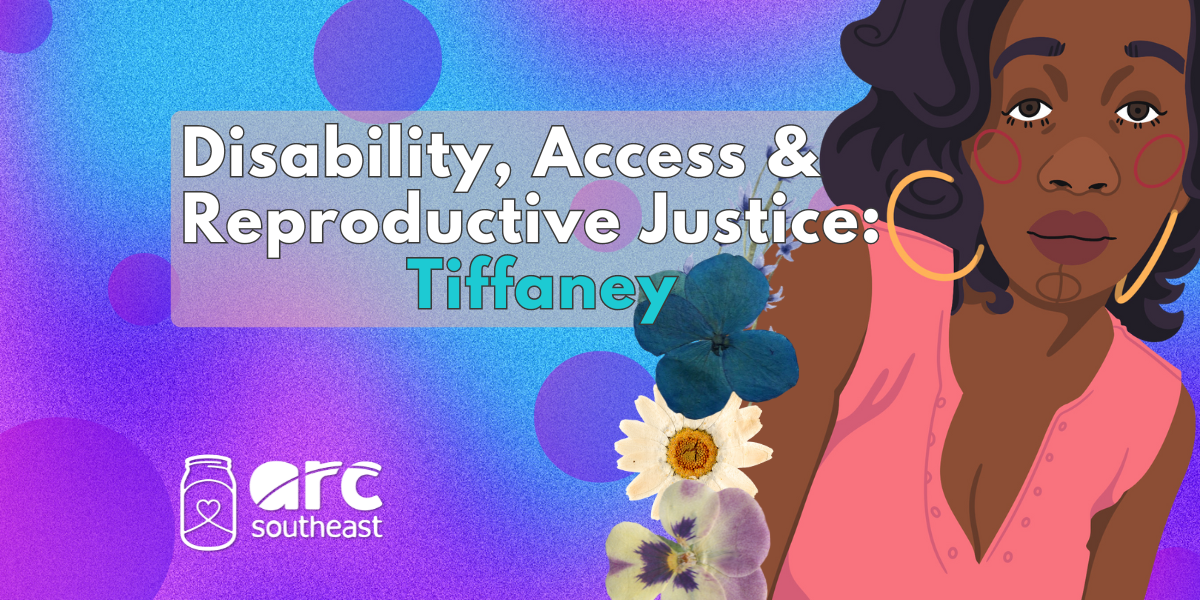Tiffaney D., ARC-Southeast Admin & Finance Coordinator, shares some of her thoughts and experiences about disability, access, and reproductive justice.
How does disability and access show up in your work at ARC-Southeast
I make modifications to my physical set up at my desk; a keyboard extender, wireless mouse, additional monitor, and monitor stand. I have to always ensure that my feet don’t dangle, so I need a footstool as well. I make adjustments to my screen all day due to the size and layout of different websites. Some prints are difficult for me to read even with glasses. In those cases, I use a magnifying glass. I often use some sort of modification for articles to be read aloud for me.
These are just the steps I need to take every single day while working. When I am working on reports and projects, I am constantly thinking of ways to make the reports more inclusive for those of us with disabilities.
What do you think about the intersection of reproductive and disability justice?
I think of how I have had to navigate my own reproductive care. Something as simple as lying down on my back requires a modification, and I get nervous at the thought of having a care provider who is not patient and understanding of my “invisible” disability. I’m concerned about the commentary that I hear when discussing my reproductive healthcare choices, because I’ve always heard “disabled people should try their best not to get pregnant.” I have even heard that people “like me” are just a burden on society. I have worked my whole life with my abilities and taken care of myself but as soon as I mention reproductive care, people want to monitor my body and decisions.
What would you like to tell abortion seekers with disabilities?
That they have the right to accessible, respect-centered and non-judgmental healthcare. That they can 100% ask questions and speak up for themselves. We deserve respect and can ask for whatever we need to ensure the best experience possible. Your autonomy, voice, and choices are valid. Wherever possible, seek out support and resources that will help you navigate your wellness.
What’s one way that you wish people would think differently about disability and disabled folks?
I just wish people understood that we are humans too… that our bodies are just as unique and perfect as everyone else’s. We’re just organized differently. We feel, we laugh, we work, we cry, we reproduce. We make decisions about our healthcare, too.
How are you making disability justice and access a practice in your life?
I try to increase awareness of my own physical needs in every space that I enter. Speaking up for myself sometimes gives others the opportunity to do so as well. I have learned that saying I need help lifts some of the anxiety that I have when thinking of doing the task alone. It’s my way of bucking the INDIVIDUALIST way of thinking in society and underscores that we are interconnected.
What’s one important lesson that being disabled and/or disability justice has taught you, that the world should know?
I have learned that my voice is valuable. I have to use it to advocate for myself as well as those I am in community with, and that we all have to rely on one another. Disability justice helps demonstrate that it is important to support those in your community, support mutual aid funds, and emphasize collective care.
Together, we can uphold bodily autonomy and access for all, because one’s disability, race, location, or class should never be a barrier for accessing abortion care. We create the power to direct our own lives and communities when we support abortion funds. If you believe in reproductive justice for all Southerners, consider making a donation today!

